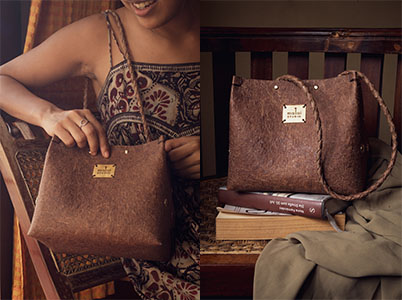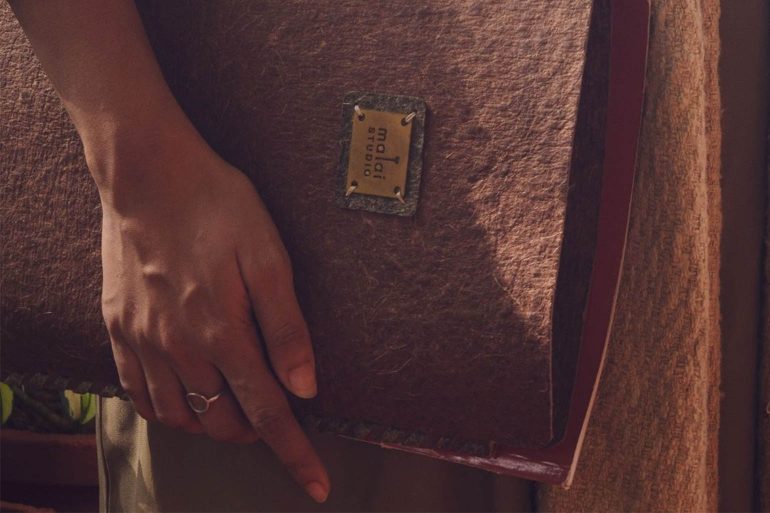This article is third in the Alchemist series on material researchers and material designers. This article is on Kerala-based Malai Studio which produced vegan leather from a byproduct of coconut.
In recent years, the leather industry has come under criticism for its ecological impacts. Informed consumers have begun to examine the environmental effects of their purchasing decisions. Leather’s long history stems from the prehistoric era when dried animal hide was used as protective coverings. The conditions for survival have changed with time—humanity is currently battling an array of environmental issues and urgently needs to work on cleaner, alternative materials. Malai Studio is a Kerala-based startup at the forefront of sustainable innovation in India, offering the world a bio-based alternative they found in waste coconut water.

The founders, Zuzana Gombosova and Susmith C, were united by their passions for craft and sustainability, and decided to explore the potential of a new material from by-products of coconut. South India is abundant with coconuts, providing employment to a large sections of the society and thereby leaving behind massive amounts of waste material. The duo saw an opportunity and began experimenting with bacterial cellulose in coconut water, resulting in a biocomposite material that could be grown on agricultural waste.
Having amassed a loyal following of green warriors, the brand has been creatively navigating the tough road towards the commercialisation of biomaterials.
Working along with local farmers and processing units, Malai Studio collects waste coconut water that would otherwise cause unwanted acidity in soil and water. The material ‘malai’ is obtained from sterilised and fermented coconut water, on which bacterial culture is left to feed on. The process results in a sheet of cellulose jelly which is further harvested, refined and reinforced with natural fibres. ‘Malai’ is flexible, water-resistant, and durable. It can be moulded into sheets, which are then used to craft shoes, bags, wallets, and other accessories.

Malai Studio has received acclaim at London Design Week and the Prague Design Week, and has taken the first prize in the Circular Design Challenge at Lakme Fashion Week, Mumbai. Stirring heads and headlines, the PETA-approved brand has also been collaborating with international fashion designers to bring forth an era of sustainable fashion. Having amassed a loyal following of green warriors, the brand has been creatively navigating the tough road towards the commercialisation of biomaterials. So far, they have launched two crowd-funding campaigns which gave them the opportunity of turning fans into customers. “I like this way of funding because it’s very transparent — deliverables and timelines are set, and the investments are not too high to pose any risk to an individual,” Zuzana shares.
Consumers, on the other hand, are excited and eager to give their material a chance and support their cause. The largest interest comes from the younger age group of 18-25-year-olds.
To Zuzana, finding the right partnership is the key to running an experimental start-up. Though investors are enticed by the potential of the material, it is difficult to agree upon scheduled results as the brand is still at its initial stages of growth. After the internet boom, it’s more difficult to find investors willing to put their money into physical technology as it devalues quickly. Consumers, on the other hand, are excited and eager to give their material a chance and support their cause. The largest interest comes from the younger age group of 18-25-year-olds.
Malai is at an advantage since the raw material will most likely be abundantly available in the future.
Biomaterials are still a relatively new concept and are yet to be adopted en-masse. Most of them — from materials used for medical purposes to material with bio-sourced ingredients — are still under research and development, and are a long way from validation. Malai itself is at a very early stage, and is currently aiming to advance their research and development to make the material more durable and applicable to wider industries.

Finding the right investor to fuel growth, and charting out their scale-up based on data analysis are some other stepping stones towards more widespread adoption. Malai is at an advantage since the raw material will most likely be abundantly available in the future. “I believe the material will be more widely adopted when we achieve better price — this goes hand in hand with scale-up and better performance of the material,” Zuzana points out.
The team has also been enabling consumers to carry some weight of environmental responsibility.
Malai Biomaterials has been measuring their positive impact in terms of feedstock used, chemistry used, waste management, energy and water use, and end of life of the product. Sourcing agricultural waste has had an immense social impact on the farmers, processing units and the locality. The team has also been enabling consumers to carry some weight of environmental responsibility. The founders say, “A small business like ours must make sure people understand how things can be done differently and how they can make an impact with their choices.”
***
Ankitha Gattupalli is an architect and active contributor to discourse on spatial practices. Her work aims to uncover and reshape the processes through which spaces, ecologies and communities are collectively created. This article is second in the Alchemist series on material researchers and biomaterials. Gattupalli previously wrote about material designer Sachi Tungare, who created a new material out of marigolds, and on material researcher Tejas Sidnal, who upcycled carbon black into construction tiles . Read here and here.

